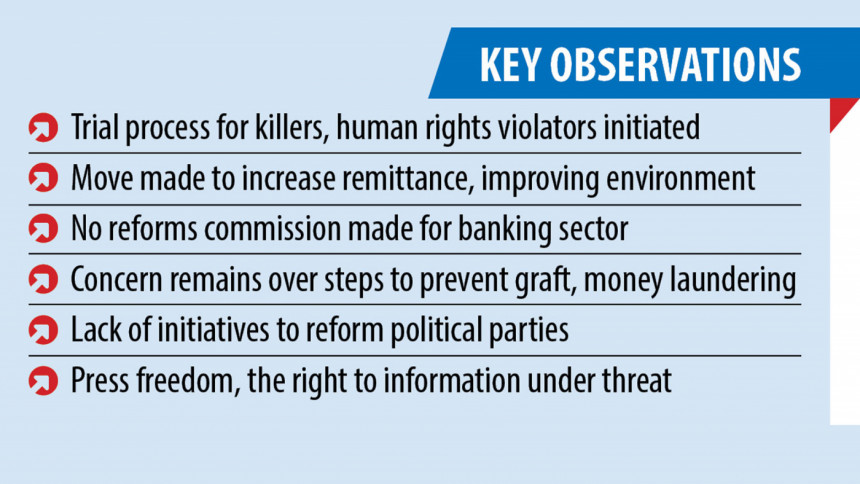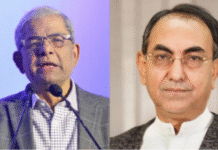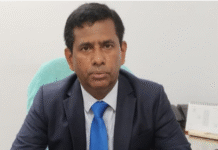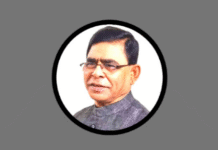
Despite numerous challenges, the interim government over the last 100 days has taken many timely and significant steps that align with the vision of building a “new Bangladesh”, observed Transparency International Bangladesh yesterday.
It said the government move to try killers and human rights violators from the previous regime; efforts to provide compensation and medical care to those injured in the movement; and the repeal of the Cyber Security Act were noteworthy.
However, the expected reigning in of inflation has not happened and problems with law and order remain, it said.
Challenges also persist in bringing lasting reforms to key institutions, including the Election Commission, Anti-Corruption Commission, Human Rights Commission, and Information Commission, said the TIB.
It came up with the observations while unveiling a research report titled “New Bangladesh: Observations on the First 100 Days after the Fall of the Authoritarian Regime” at a press conference at its office in the capital.
The TIB presented its observations on 41 sectors, covering a wide range of issues, including political, administrative and institutional reforms, and appointments and reshuffles.
It also reviewed rule of law and human rights situations, the justice system, law enforcement agencies, and the judiciary.
Additionally, the report highlighted concerns over corruption, irregularities, and money laundering.
“In its 100 days, the interim government has taken numerous timely and significant measures. Despite challenges in certain areas, progress is evident in the pursuit of a ‘new Bangladesh’,” said TIB Executive Director Iftekharuzzaman.
He said commissions were formed for reforms to key sectors and there have been visible changes in the financial sector.
The initiative to hold the fallen government’s ministers, MPs, and allies accountable for corruption along with strategic steps to recover laundered money are significant achievements, he said.
In a press release, he said, “It was evident that the essential strategies and roadmaps had not been put together right away to meet the important responsibilities of state reform and infrastructure development, which are vital for realising the objectives of the new political settlement entrusted to the interim government.”
Iftekharuzzaman criticised the ad-hoc approach to administrative decision-making and exclusion of the private and educational sectors from the reform initiatives.
“Another key issue is the lack of initiatives to reform political parties and their internal politics in the context of the anti-discrimination movement,” he said.
“Moreover, the absence of the role of the army in ensuring peace and order in the Chittagong Hill Tracts, despite its exclusive authority, along with the deliberate attacks and threats against some media outlets to silence them, raises serious concerns, TIB believes.”
The TIB also spoke about press freedom, the right to information, the local government system, education, health, and other critical sectors.
Regarding politics, the TIB said the government’s decision-making process regarding banning or withdrawing bans on political parties has been widely criticised, and the culture of appointing or cancelling appointments based on political affiliation continues.
It noted that the way appointments were being made failed to meet established standards and that transparency was absent.
The report said in some instances, false and baseless cases were being filed against individuals. There are allegations of indiscriminately naming individuals as accused in cases and accusing people in cases only to extort money from them for dropping their names.
Cases are also being filed against individuals due to personal enmity, political rivalry, and to harass people.
Allegations of cases being accepted under pressure without proper investigation and reports of individuals being arrested from different locations were mentioned in the report.
The TIB also mentioned the criticism and controversy regarding the appointments of judges and prosecutors to the International Crimes Tribunal. It said questions have been raised about their competence, experience, and political affiliations.
It said Awami League leaders and activists were attacked in court; a Bangladesh Chhatra League female leader was assaulted in front of members of law enforcement agencies; and attacks were carried out on rival lawyers.
Regarding law and order, the TIB said there was a lack of effective measures to verify incidents, identify perpetrators, conduct investigations, and in taking action in cases of attacks on religious minorities, indigenous peoples, marginalised groups, and dissenting communities.
Questions were raised regarding the release of top criminals, the report said, adding that extrajudicial killings by different forces were still going on.
On the banking sector, it said no visible steps have been taken to form a banking sector reform commission.
On inflation, the TIB noted that although several initiatives have been taken to control prices of essentials and inflation, they, especially food inflation, remain significantly high.
Regarding press freedom and the right to information, it pointed out that targeted attacks, threats, and attempts to shut down media outlets pose significant risks to media freedom.
On local government, the TIB said the termination of city corporation mayors, UP chairmen, vice-chairmen, and other elected members left local government at a standstill. It also mentioned forced resignations in the education and health sectors. The health sector also suffered because of partisan politics.
The TIB said the culture of establishing control and dominance persists in the BNP.
It said the Indian government and media outlets have failed to accept the fall of the authoritarian regime amid the uprising, which is embarrassing and shameful for India.
The study reported impatience among stakeholders, including political parties, in giving the government time for reforms.
No reforms within parties have been observed, which highlights a failure to embrace the core spirit of the anti-discrimination movement, it said, adding that the influence of religion-based politics is also growing.
The role of students in overthrowing the authoritarian government was crucial, but some of them lacked a firm stance and political tolerance.
About polls, Iftekharuzzaman said without creating a conducive legal and institutional environment with specific steps for reforms, holding elections hastily would not achieve the goals of the student-led movement.
Iftekharuzzaman, also chairman of the Reform Commission for the Anti-Corruption Commission, said questions were being raised about the time for elections and suggested the government that it answers those questions.
He said concrete reforms must be made following the recommendations of the reform commissions. Considering these, the government must clarify how much time is needed to prepare for elections.
The TIB said the government was enjoying international support.
Loan conditions of the World Bank, ADB, and IMF, and rising debt repayments were posing as additional financial challenges, it added.
Daily Star









